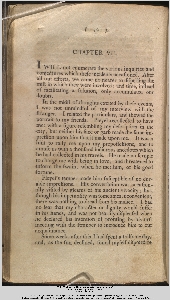 ―72― ―72―
CHAPTER VII.
I WILL not enumerate the various inquiries and
conjectures which these incidents occasioned. After
all our efforts, we came no nearer to dispelling the
mist in which they were involved; and time, instead
of facilitating a solution, only accumulated our
doubts.
In the midst of thoughts excited by these events,
I was not unmindful of my interview with the
stranger. I related the particulars, and shewed the
portrait to my friends. Pleyel recollected to have
met with a figure resembling my description in the
city; but neither his face or garb made the same im-
pression upon him that it made upon me. It was a
hint to rally me upon my prepossessions, and to
amuse us with a thousand ludicrous anecdotes which
he had collected in his travels. He made no scruple
to charge me with being in love; and threatened to
inform the swain, when he met him, of his good
fortune.
Pleyel's temper made him susceptible of no dur-
able impressions. His conversation was occasion-
ally visited by gleams of his ancient vivacity; but,
though his impetuosity was sometimes inconvenient,
there was nothing to dread from his malice. I had
no fear that my character or dignity would suffer
in his hands, and was not heartily displeased when
he declared his intention of profiting by his first
meeting with the stranger to introduce him to our
acquaintance.
Some weeks after this I had spent a toilsome day,
and, as the sun declined, found myself disposed to
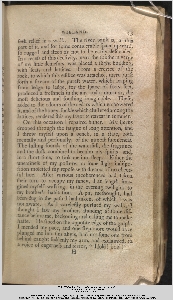 ―73― ―73―
seek relief in a walk. The river bank is, at this
part of it, and for some considerable space upward,
so rugged and steep as not to be easily descended.
In a recess of this declivity, near the southern verge
of my little demesne, was placed a slight building,
with seats and lattices. From a crevice of the
rock, to which this edifice was attached, there burst
forth a stream of the purest water, which, leaping
from ledge to ledge, for the space of sixty feet,
produced a freshness in the air, and a murmur, the
most delicious and soothing imaginable. These,
added to the odours of the cedars which embowered
it, and of the honey-suckle which clustered among the
lattices, rendered this my favorite retreat in summer.
On this occasion I repaired hither. My spirits
drooped through the fatigue of long attention, and
I threw myself upon a bench, in a state, both
mentally and personally, of the utmost supineness.
The lulling sounds of the waterfall, the fragrance
and the dusk combined to becalm my spirits, and,
in a short time, to sink me into sleep. Either the
uneasiness of my posture, or some slight indispo-
sition molested my repose with dreams of no cheer-
ful hue. After various incoherences had taken
their turn to occupy my fancy, I at length ima-
gined myself walking, in the evening twilight, to
my brother's habitation. A pit, methought, had
been dug in the path I had taken, of which I was
not aware. As I carelessly pursued my walk, I
thought I saw my brother, standing at some dis-
tance before me, beckoning and calling me to make
haste. He stood on the opposite edge of the gulph.
I mended my pace, and one step more would have
plunged me into this abyss, had not some one from
behind caught suddenly my arm, and exclaimed, in
a voice of eagerness and terror, "Hold! hold!"
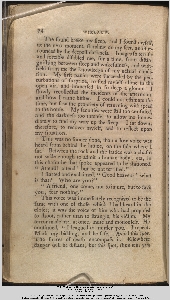 ―74― ―74―
The sound broke my sleep, and I found myself,
at the next moment, standing on my feet, and sur-
rounded by the deepest darkness. Images so terrific
and forcible disabled me, for a time, from distin-
guishing between sleep and wakefulness, and with-
held from me the knowledge of my actual condi-
tion. My first panics were succeeded by the per-
turbations of surprize, to find myself alone in the
open air, and immersed in so deep a gloom. I
slowly recollected the incidents of the afternoon,
and how I came hither. I could not estimate the
time, but saw the propriety of returning with speed
to the house. My faculties were still too confused,
and the darkness too intense, to allow me imme-
diately to find my way up the steep. I sat down,
therefore, to recover myself, and to reflect upon
my situation.
This was no sooner done, than a low voice was
heard from behind the lattice, on the side where I
sat. Between the rock and the lattice was a chasm
not wide enough to admit a human body; yet, in
this chasm he that spoke appeared to be stationed.
"Attend! attend! but be not terrified."
I started and exclaimed, "Good heavens! what
is that? Who are you?"
"A friend; one come, not to injure, but to save
you; fear nothing."
This voice was immediately recognized to be the
same with one of those which I had heard in the
closet; it was the voice of him who had proposed
to shoot, rather than to strangle, his victim. My
terror made me, at once, mute and motionless. He
continued, "I leagued to murder you. I repent.
Mark my bidding, and be safe. Avoid this spot.
The snares of death encompass it. Elsewhere
danger will be distant; but this spot, shun it as you
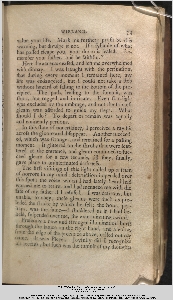 ―75― ―75―
value your life. Mark me further; profit by this
warning, but divulge it not. If a syllable of what
has passed escape you, your doom is sealed. Re-
member your father, and be faithful."
Here the accents ceased, and left me overwhelmed
with dismay. I was fraught with the persuasion,
that during every moment I remained here, my
life was endangered; but I could not take a step
without hazard of falling to the bottom of the pre-
cipice. The path, leading to the summit, was
short, but rugged and intricate. Even star-light
was excluded by the umbrage, and not the faintest
gleam was afforded to guide my steps. What
should I do? To depart or remain was equally
and eminently perilous.
In this state of uncertainty, I perceived a ray flit
across the gloom and disappear. Another succeed-
ed, which was stronger, and remained for a passing
moment. It glittered on the shrubs that were scat-
tered at the entrance, and gleam continued to suc-
ceed gleam for a few seconds, till they, finally,
gave place to unintermitted darkness.
The first visitings of this light called up a train
of horrors in my mind; destruction impended over
this spot; the voice which I had lately heard had
warned me to retire, and had menaced me with the
fate of my father if I refused. I was desirous, but
unable, to obey; these gleams were such as pre-
luded the stroke by which he fell; the hour, per-
haps, was the same—I shuddered as if I had be-
held, suspended over me, the exterminating sword.
Presently a new and stronger illumination burst
through the lattice on the right hand, and a voice,
from the edge of the precipice above, called out my
name. It was Pleyel. Joyfully did I recognize
his accents; but such was the tumult of my thoughts
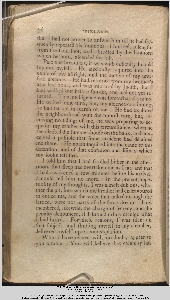 ―76― ―76―
that I had not power to answer him till he had fre-
quently repeated his summons. I hurried, at length,
from the fatal spot, and, directed by the lanthorn
which he bore, ascended the hill.
Pale and breathless, it was with difficulty I could
support myself. He anxiously inquired into the
cause of my affright, and the motive of my unu-
sual absence. He had returned from my brother's
at a late hour, and was informed by Judith, that I
had walked out before sun-set, and had not yet re-
turned. This intelligence was somewhat alarming.
He waited some time; but, my absence continuing,
he had set out in search of me. He had explored
the neighbourhood with the utmost care, but, re-
ceiving no tidings of me, he was preparing to ac-
quaint my brother with this circumstance, when he
recollected the summer-house on the bank, and con-
ceived it possible that some accident had detained
me there. He again inquired into the cause of this
detention, and of that confusion and dismay which
my looks testified.
I told him that I had strolled hither in the after-
noon, that sleep had overtaken me as I sat, and that
I had awakened a few minutes before his arrival.
I could tell him no more. In the present impe-
tuosity of my thoughts, I was almost dubious, whe-
ther the pit, into which my brother had endeavoured
to entice me, and the voice that talked through the
lattice, were not parts of the same dream. I re-
membered, likewise, the charge of secrecy, and the
penalty denounced, if I should rashly divulge what
I had heard. For these reasons, I was silent on
that subject, and shutting myself in my chamber,
delivered myself up to contemplation.
What I have related will, no doubt, appear to
you a fable. You will believe that calamity has
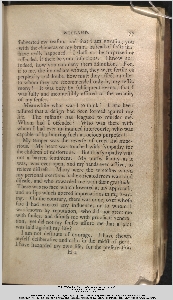 ―77― ―77―
subverted my reason, and that I am amusing you
with the chimeras of my brain, instead of facts that
have really happened. I shall not be surprized or
offended, if these be your suspicions. I know not,
indeed, how you can deny them admission. For,
if to me, the immediate witness, they were fertile of
perplexity and doubt, how must they affect another
to whom they are recommended only by my testi-
mony? It was only by subsequent events, that I
was fully and incontestibly assured of the veracity
of my senses.
Meanwhile what was I to think? I had been
assured that a design had been formed against my
life. The ruffians had leagued to murder me.
Whom had I offended? Who was there with
whom I had ever maintained intercourse, who was
capable of harbouring such atrocious purposes?
My temper was the reverse of cruel and impe-
rious. My heart was touched with sympathy for
the children of misfortune. But this sympathy was
not a barren sentiment. My purse, scanty as it
was, was ever open, and my hands ever active, to
relieve distress. Many were the wretches whom
my personal exertions had extricated from want and
disease, and who rewarded me with their gratitude.
There was no face which lowered at my approach,
and no lips which uttered imprecations in my hear-
ing. On the contrary, there was none, over whose
fate I had exerted any influence, or to whom I
was known by reputation, who did not greet me
with smiles, and dismiss me with proofs of venera-
tion; yet did not my senses assure me that a plot
was laid against my life?
I am not destitute of courage. I have shewn
myself deliberative and calm in the midst of peril.
I have hazarded my own life, for the preservation
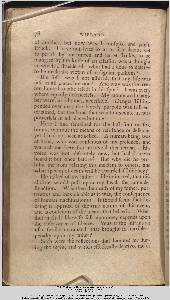 ―78― ―78―
of another, but now was I confused and panic
struck. I have not lived so as to fear death, yet
to perish by an unseen and secret stroke, to be
mangled by the knife of an assassin was a thought
at which I shuddered; what had I done to deserve
to be made the victim of malignant passions?
But soft! was I not assured, that my life was
safe in all places but one? And why was the trea-
son limited to take effect in this spot? I was every
where equally defenceless. My house and cham-
ber were, at all times, accessible. Danger still im-
pended over me; the bloody purpose was still en-
tertained, but the hand that was to execute it, was
powerless in all places but one!
Here I had remained for the last four or five
hours, without the means of resistance or defence,
yet I had not been attacked. A human being was
at hand, who was conscious of my presence, and
warned me hereafter to avoid this retreat. His
voice was not absolutely new, but had I never
heard it but once before? But why did he pro-
hibit me from relating this incident to others, and
what species of death will be awarded if I disobey?
He talked of my father. He intimated, that dis-
closure would pull upon my head, the same de-
struction. Was then the death of my father, por-
tentous and inexplicable as it was, the consequence
of human machinations? It should seem, that this
being is apprised of the true nature of this event,
and is conscious of the means that led to it. Whe-
ther it shall likewise fall upon me, depends upon
the observance of silence. Was it the infraction
of a similar command, that brought so horrible a
penalty upon my father?
Such were the reflections that haunted me dur-
ing the night, and which effectually deprived me of
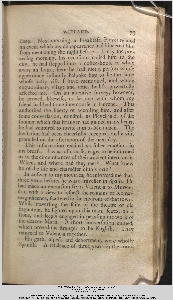 ―79― ―79―
sleep. Next morning, at breakfast, Pleyel related
an event which my disappearance had hindered him
from mentioning the night before. Early the pre-
ceding morning, his occasions called him to the
city; he had stepped into a coffee-house to while
away an hour; here he had met a person whose
appearance instantly bespoke him to be the same
whose hasty visit I have mentioned, and whose
extraordinary visage and tones had so powerfully
affected me. On an attentive survey, however,
he proved, likewise, to be one with whom my
friend had had some intercourse in Europe. This
authorised the liberty of accosting him, and after
some conversation, mindful, as Pleyel said, of the
footing which this stranger had gained in my heart,
he had ventured to invite him to Mettingen. The
invitation had been cheerfully accepted, and a visit
promised on the afternoon of the next day.
This information excited no sober emotions in
my breast. I was, of course, eager to be informed
as to the circumstances of their ancient intercourse.
When, and where had they met? What knew
he of the life and character of this man?
In answer to my inquiries, he informed me that,
three years before, he was a traveller in Spain. He
had made an excursion from Valencia to Murvie-
dro, with a view to inspect the remains of Roman
magnificence, scattered in the environs of that town.
While traversing the scite of the theatre of old
Saguntum, he lighted upon this man, seated on a
stone, and deeply engaged in perusing the work of
the deacon Marti. A short conversation ensued,
which proved the stranger to be English. They
returned to Valencia together.
His garb, aspect, and deportment, were wholly
Spanish. A residence of three years in the coun-
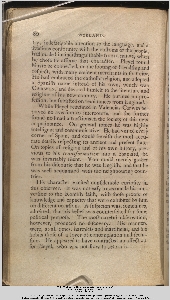 ―80― ―80―
try, indefatigable attention to the language, and a
studious conformity with the customs of the people,
had made him indistinguishable from a native, when
he chose to assume that character. Pleyel found
him to be connected, on the footing of friendship and
respect, with many eminent merchants in that city.
He had embraced the catholic religion, and adopted
a Spanish name instead of his own, which was
Carwin, and devoted himself to the literature and
religion of his new country. He pursued no pro-
fession, but subsisted on remittances from England.
While Pleyel remained in Valencia, Carwin be-
trayed no aversion to intercourse, and the former
found no small attractions in the society of this new
acquaintance. On general topics he was highly
intelligent and communicative. He had visited every
corner of Spain, and could furnish the most accu-
rate details respecting its ancient and present state.
On topics of religion and of his own history, pre-
vious to his transformation into a Spaniard, he
was invariably silent. You could merely gather
from his discourse that he was English, and that he
was well acquainted with the neighbouring coun-
tries.
His character excited considerable curiosity in
this observer. It was not easy to reconcile his con-
version to the Romish faith, with those proofs of
knowledge and capacity that were exhibited by him
on different occasions. A suspicion was, sometimes,
admitted, that his belief was counterfeited for some
political purpose. The most careful observation,
however, produced no discovery. His manners
were, at all times, harmless and inartificial, and his
habits those of a lover of contemplation and seclu-
sion. He appeared to have contracted an affection
for Pleyel, who was not slow to return it.
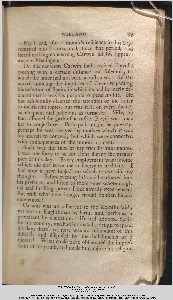 ―81― ―81―
My friend, after a month's residence in this city,
returned into France, and, since that period, had
heard nothing concerning Carwin till his appear-
ance at Mettingen.
On this occasion Carwin had received Pleyel's
greeting with a certain distance and solemnity to
which the latter had not been accustomed. He had
waved noticing the inquiries of Pleyel respecting
his desertion of Spain, in which he had formerly de-
clared that it was his purpose to spend his life. He
had assiduously diverted the attention of the latter
to indifferent topics, but was still, on every theme,
as eloquent and judicious as formerly. Why he
had assumed the garb of a rustic, Pleyel was una-
ble to conjecture. Perhaps it might be poverty,
perhaps he was swayed by motives which it was
his interest to conceal, but which were connected
with consequences of the utmost moment.
Such was the sum of my friend's information.
I was not sorry to be left alone during the greater
part of this day. Every employment was irksome
which did not leave me at liberty to meditate. I
had now a new subject on which to exercise my
thoughts. Before evening I should be ushered into
his presence, and listen to those tones whose magi-
cal and thrilling power I had already experienced.
But with what new images would he then be ac-
companied?
Carwin was an adherent to the Romish faith,
yet was an Englishman by birth, and, perhaps, a
protestant by education. He had adopted Spain
for his country, and had intimated a design to spend
his days there, yet now was an inhabitant of this
district, and disguised by the habiliments of a
clown! What could have obliterated the impres-
sions of his youth, and made him abjure his religion
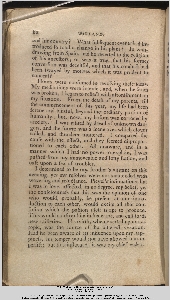 ―82― ―82―
and his country? What subsequent events had in-
troduced so total a change in his plans? In with-
drawing from Spain, had he reverted to the religion
of his ancestors; or was it true, that his former
conversion was deceitful, and that his conduct had
been swayed by motives which it was prudent to
conceal?
Hours were consumed in revolving these ideas.
My meditations were intense; and, when the series
was broken, I began to reflect with astonishment on
my situation. From the death of my parents, till
the commencement of this year, my life had been
serene and blissful, beyond the ordinary portion of
humanity; but, now, my bosom was corroded by
anxiety. I was visited by dread of unknown dan-
gers, and the future was a scene over which clouds
rolled, and thunders muttered. I compared the
cause with the effect, and they seemed dispropor-
tioned to each other. All unaware, and in a
manner which I had no power to explain, I was
pushed from my immoveable and lofty station, and
cast upon a sea of troubles.
I determined to be my brother's visitant on this
evening, yet my resolves were not unattended with
wavering and reluctance. Pleyel's insinuations that
I was in love, affected, in no degree, my belief, yet
the consciousness that this was the opinion of one
who would, probably, be present at our intro-
duction to each other, would excite all that con-
fusion which the passion itself is apt to produce.
This would confirm him in his error, and call forth
new railleries. His mirth, when exerted upon this
topic, was the source of the bitterest vexation.
Had he been aware of its influence upon my hap-
piness, his temper would not have allowed him to
persist; but this influence, it was my chief endea-
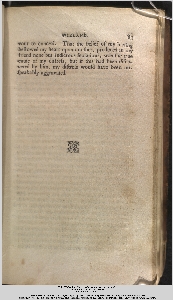 ―83― ―83―
vour to conceal. That the belief of my having
bestowed my heart upon another, produced in my
friend none but ludicrous sensations, was the true
cause of my distress; but if this had been disco-
vered by him, my distress would have been un-
speakably aggravated.
|